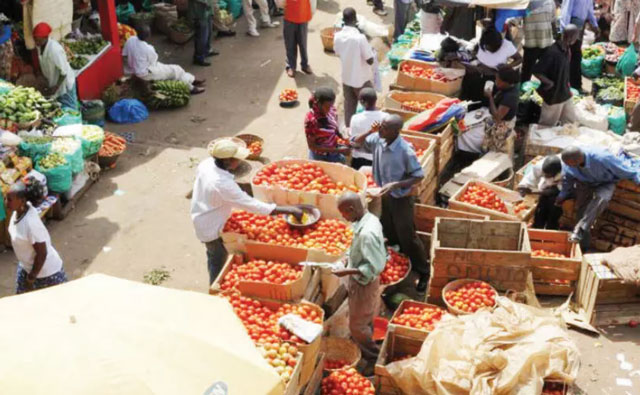
New survey finds 53% positive about future of economy, democracy
COVER STORY | BY INDEPENDENT REPORTER | The latest report by the survey research body, Afrobarometer, has brought to the fore both expected and completely unexpected perceptions of Ugandans on a range of topical issues.
The survey asked questions about the views of respondents on the country’s overall direction, most important problems, economic life, development and international relations, democracy and politics, responsive and transparent government, freedoms, citizenship and participation, rule of law, and elections.
More questions were on institutions and leaders, corruption, public services and government performance, services and facilities in the enumeration area, citizens’ experiences with public services, government performance, gender equality and gender-based violence, child welfare, identity, society, and pluralism, security, crime, and the police, climate change and the environment, media, and others.
Released on the Afrobarometer website on Aug.8, the summary of results for the Afrobarometer Round 9 survey in Uganda, shows it yielded significant insights into the demographics of Uganda’s population. For example, that most people, about 80%; both in villages and towns, can go for long periods without getting any cash or income in their pockets. The cash problem is most acute in Kampala (86%) and Central 85%.
More people are looking for jobs in northern and eastern regions and that more Ugandans in rural areas say they have gone without enough food to eat (41%) either several times, many times or always, compared to 36% in urban areas. More people in rural areas also go without medicines or medical treatment (62%) compared to 46% in urban areas.
More people are looking for jobs in northern and eastern regions and that more Ugandans in rural areas say they have gone without enough food to eat (41%) either several times, many times or always, compared to 36% in urban areas.
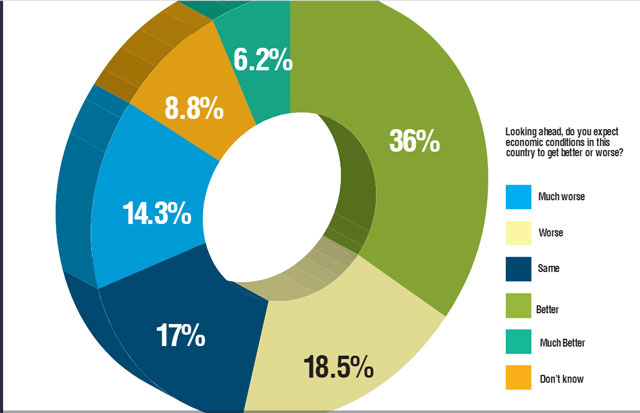
The survey shows many Ugandans own a mobile phone (74%), a radio (63%) and very few own a Television (24%), a computer (7%), a Bank Account (23%) and a motor vehicle or motor cycle (14%). Up to 75% have never used the internet and only 11% have piped water in their compound and 73% do not have electricity.
The survey report reports also includes general information, such as that most Ugandans are aged between 18-35 years (59%) and live in rural areas (74%). Baganda are the biggest tribe (18%) followed by Banyankore (13%), Basoga (12%), and Ateso (9%). Most are Roman Catholic (37%), followed by Anglican (26%), Muslim (15%) and Pentecostals-Born-Again (9%).
Right or wrong direction?
When asked whether, in their view, they would say the country is going in the wrong direction or going in the right direction, the majority (51%) said it was going in the wrong direction and 48% said it was going in the right direction. People in town especially said the country is going in the wrong direction (58%) and in the central region that figure was 71%.
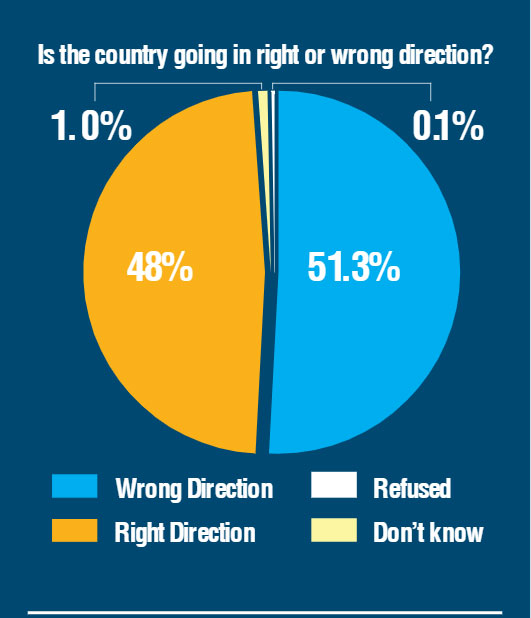
However, more women (50%) said the country is going in the right direction compared to 45% men and 70% of people in the West said it was going in the right direction compared to 37% in Kampala and 26% in central.
Biggest problems
Lack of water, health services, corruption, bad roads, and education are the biggest problems the country faces according to most respondents. These are closely followed by unemployment, poverty, crime and insecurity, politics, and agriculture markets.
When asked what, in their view, are the most important problems facing this country that government should address, the biggest number mentioned health (19%) followed by education (12%), and water supply 10%, and bad roads (9.9%).
Some of the most notable responses recorded concerned the economy. The first question was: In general, how would you describe the present economic condition of this country? The majority (66%) described the present economic condition of the country as either very bad (32%) or fairly bad 35%. Only 26% said they would describe the present economic condition of this country as either fairly good (20%) or very good 6%. More people in town said the economy was very bad compared to people in villages.
More people in central region said the economy was very bad (46%) and the western region was where the least people said it was very bad (18%).
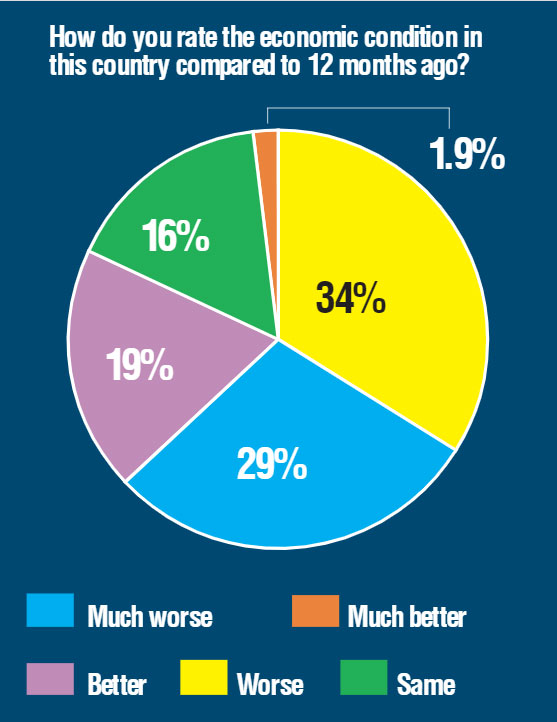
Rating the economy
The next question was: In general, how would you describe your own present living conditions? Unlike other views, these positions appeared to be uniform across the country, be it in urban or rural enumeration areas. Up to 58% said they would describe their own present living conditions as either very bad (25%) or fairly bad (33%). Only 7% would say it was very good and 27% would say it was fairly good. The biggest number to say their own present living conditions were very bad were from eastern region (34%) followed by the northern region (32%). In the central region that figure was 18%, in the west 15%, and in Kampala 23%.
The respondents, however, gave very notable responses when asked the following two question: One, looking back, how do you rate economic conditions in this country compared to 12 months ago? And two, looking ahead, do you expect economic conditions in this country to be better or worse in 12 months’ time?
When asked the question: Looking back, how do you rate economic conditions in this country compared to 12 months ago; the majority of respondents were negative. Up to 63% said they rate economic conditions in this country compared to 12 months ago as either much worse (29%) or worse (34%). Only 2% said they would rate the economic conditions in this country compared to 12 months ago as “much better” and 19% as better.
However, when asked the question: Looking ahead, do you expect the economic conditions in this country to be better or worse in 12 months’ time; the respondents sounded very positive. The biggest number (36%) said they expect the economic conditions in this country to be “better” in 12 months’ time. Another 17% said they expect the economic conditions in the country to remain the same. That is, the percentage of the respondents with a positive outlook is about the economy at 53%. Only 14% said they expect the economic conditions in the country to be “much worse” and 19% said they expect the conditions to be “worse.”
It is not clear from the report what makes Ugandans so full of hope regarding the economy.
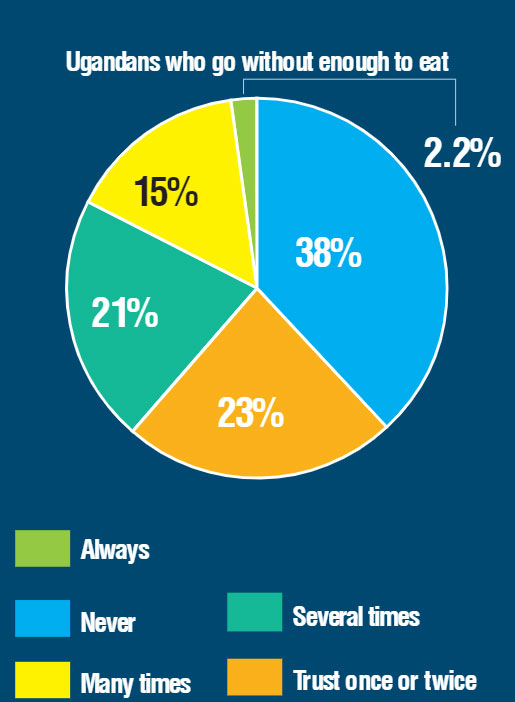
Equally notable, however, is the regional distribution of the positive views about the future of the economy. Recalling that more people in central region earlier said the economy was very bad (46%) and the western region was where the least people said it was very bad (18%), this time the positivity is switched. More people in the northern region (68%) and Kampala (66%) say the economy in the next 12 months would be either better, much better, or the same. The figures for the usually positive western region are much lower at 58%, central at 52%, and 55% for eastern region.
What do the people in the northern region and in Kampala see about the economy that makes them more hopeful about the future than those in western Uganda, central region, and eastern Region?
Democracy & politics
On the topics of democracy and politics and related topics of institutions and leaders, which are usually of interest to the public and are deeply covered in Afrobarometer reports and widely reported in the media, the respondents were asked about multiparty versus single party, the two-term limits, the role of the army in politics, the role of parliament, holding the government accountable, and about democracy generally. In this area also, Ugandans were largely positive.
When asked: In your opinion, how much of a democracy is Uganda today; the majority (83%) said it is a “democracy.” A big number, 34% said it is a democracy with major problems but the majority (50%) said either it was a “full democracy” (13%) or a democracy with minor problems (36%).
When asked: Overall, how satisfied are you with the way democracy works in Uganda, the biggest number 34% said they were “fairly satisfied” and 28% were “Not very satisfied.” Another 10% said they were “satisfied” which gives a total of 72% either positive or positive with reservations compared to 24% who said they were “Not satisfied at all”.
Significantly, however, when asked the question: Do you think that this country is more democratic, less democratic or about the same than it was five years ago, the biggest number 31% said it was “much less democratic.” Only 10% said it was “much more democratic.”
When asked the question: Do you think that in five years’ time this country will be more democratic than it is now, less democratic, or about the same, the biggest number (32%) said things “will be about the same.” Up to 24% said it will be much less democratic and only 13% said it will be “Much more democratic.”
Although, it is not clear from the report what makes Ugandans so full of hope regarding the economy and the future of democracy, part of the answer could be gleaned from how they feel about their individual freedom.
When asked: In this country, how free are you to say what you think, 78% said either they were “completely free” (48%) or “Somewhat free” (30%).
When asked: In this country, how free are you to join any political organisation you want, 83% said they were free.
When asked: In this country, how free are you to choose who to vote for without feeling pressured, 90% said they were free.
And when they were asked: In your opinion, how often, in this country, do people have to be careful of what they say about politics, the majority 70% said either always (40%) or often (29%).
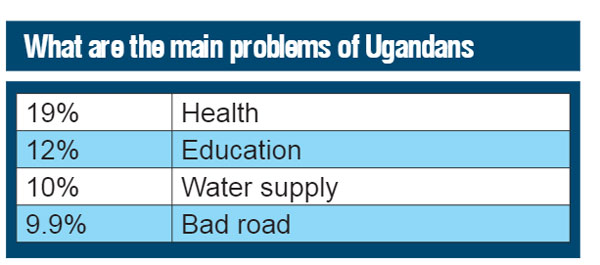
What does that mean? What would make people “always” careful about what they say about politics? Is it because they are afraid or is it because they are responsible? And where does that leave their positive responses to the Afrobarometer survey? That is the question.
About Afrobarometer
Afrobarometer, a nonprofit corporation with headquarters in Ghana, is a pan-African, nonpartisan survey research network that provides reliable data on Africans’ experiences and evaluations of democracy, governance, and quality of life. Nine rounds of surveys have been conducted in up to 42 countries since 1999.
Round 9 surveys (2021/2023) cover 39 countries. Afrobarometer’s national partners conduct face-to-face interviews in the language of the respondent’s choice with nationally representative samples.
The Afrobarometer national partner in Uganda, Hatchile Consult Ltd., interviewed a nationally representative, random, stratified probability sample of 2,400 adult Ugandans between 7 and 25 January 2022. A sample of this size yields country-level results with a margin of error of +/-2 percentage points at a 95% confidence level. An additional 992 interviews were equally distributed across the 10 newly created city administrations of Arua, Gulu, Lira, Soroti, Mbale, Jinja, Entebbe, Mbarara, Fort Portal, and Hoima to generate deeper insights on municipal services provision. Previous surveys have been conducted in Uganda in 2000, 2002, 2005, 2008, 2012, 2015, 2017, 2019, and 2021. The respondents were 50% female and 50% male, main rural (73%) and 27% urban. Francis Kibirige, the Co-national coordinator Afrobarometer survey in Uganda, was the main researcher.
 The Independent Uganda: You get the Truth we Pay the Price
The Independent Uganda: You get the Truth we Pay the Price



